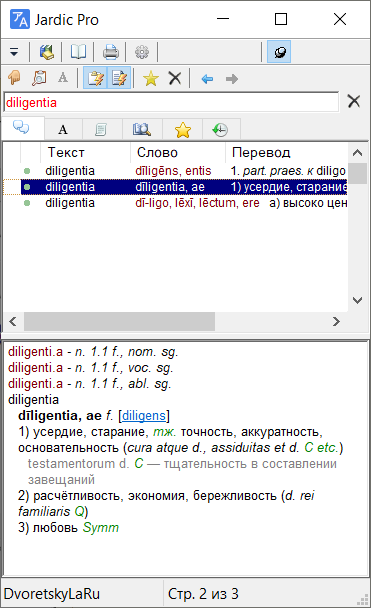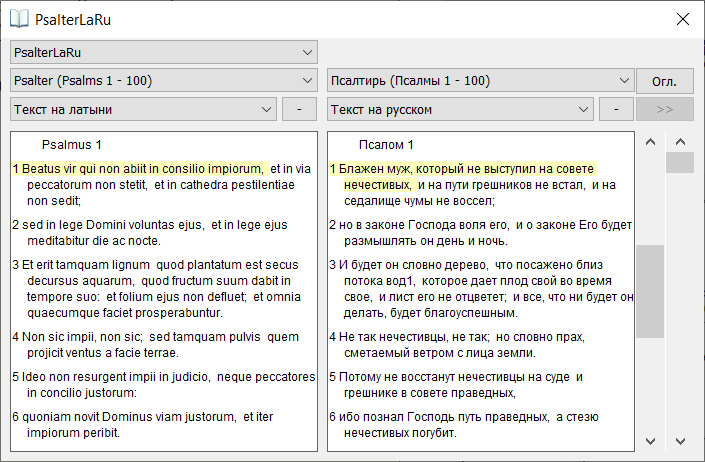Jardic Pro 11.11
Latin-Russian Dictionary
May 31, 2024
Jardic Pro with Latin-Russian dictionary by Dvoretsky and Latin-English Dictionary by William Whitaker may be useful for students of Latin or for translators of Latin texts into Russian.
Run downloaded file and follow Jardic Pro installation instructions. The program is protected with electronic signature, it does not contain ads or malicious software.
Features
- Recognizes grammar forms of Latin words. To find a translation of Latin word you may enter a word in the form appeared in the text. It is not necessary to enter a word in dictionary form.
- Word translation under the cursor in Microsoft Word, Chrome and Edge
- Translates words copied into the clipboard from any program
- Book Viewer for parallel texts in multiple languages
- Internet access is not required
- Runs on Windows computers
After Jardic Pro installation you can download additional dictionaries, e.g. Ancient Greek-Russian Dictionary by I.H. Dvoretsky.

Books with parallel text
The program can display books with Latin-Russian parallel text. If you place a cursor over Latin word the program displays a translation of the word and a description of word's grammar form. Current version of the program includes Latin-Russian parallel text of ther Psalter (Russian translation by Eugene Rosenblum) and parts from "Summa Theologiae" by Thomas Aquinas, questions: "On Will", "On Love", "On Charity" (Russian translation by A.V. Appolonov).

Transliteration of Greek letters
If Greek-Russian dictionary is installed, then you can enter Latin or Russian transliteration of Greek words for word lookup. To switch transliteration mode on, press the button[A] which is located at the right side of input field (the button switches to [Ω]). Conversion of Russian or Latin letters into Greek letters is performed using the following table (Latin letters are separated from Russian letters by semicolons):
| α - a; а | ι - i, j, i2; и, й, и2 |
| β - b, v; б, в | κ - k; к |
| γ - g; г | λ - l; л |
| δ - d; д | μ - m; м |
| ε - e; е, э | ν - n; н |
| ζ - z; з | ξ - ks; кс |
| η - i, i1; и, и1 | ο - o, o1; о, о1 |
| θ - t, th, t2, q; т, тх, т2 | π - p; п |
| ρ - r; р | φ - f; ф |
| ς - s; с | χ - x; х |
| σ - s; с | ψ - ps, y; пс |
| τ - t, t1; т, т1 | ω - o, w, o2; о, 02 |
| υ - u; у, ю |
The above table gives several variants for converting Latin or Russian
text to Greek. For example, typed letters "ps" can be interpreted as "ψ",
"πς" or "πσ", and the letter "o" as "ο" or "ω". To determine the correct
transliteration variant, the program selects the one that actually occurs
in the dictionary.
If the automatically selected transliteration variant does not satisfy,
the letters causing ambiguity should be typed with the help of those letters
that provide one-to-one conversion. Such letters are in bold type in the table.
For example, typing "epi" will lead to finding the prefix "ἐπι",
because the word "ἐπη" is not in the dictionary. However, entering "epi1"
will lead to finding words beginning with "ἐπη": "ἐπήβολος", etc.
You can also use spaces, which do not affect the search result.
Thus, typing "p s" will give "π ς" but not "ψ".
Version Changes
Version 11.11, 31.05.24
- Fixed a bug that caused word translations under the cursor to be disabled
Version 11.10, 27.05.24
- Fixed addresses of some online dictionaries
Version 11.9, 12.05.24
- Fixed bug in dictionary switch function
Version 11.8, 30.04.24
- Fixed bug in words lookup by kana and Greek letters
Version 11.7, 22.04.24
- Related to the transition of the site to HTTPS protocol - getting the list of dictionaries, etc.
Version 11.6, 31.03.24
- Latin-English Dictionary by William Whitaker was added (see notes).
- Multiple words can be copied into the input field. Each individual word can be selected by clicking on it.
Version 11.5, 30.01.24
- Latin-Russian parallel texts were added: "Summa Theologiae" by Thomas Aquinas, questions: "On Will", "On Love", "On Charity"
- Bug was fixed that could cause program exit when copying a text to clipboard